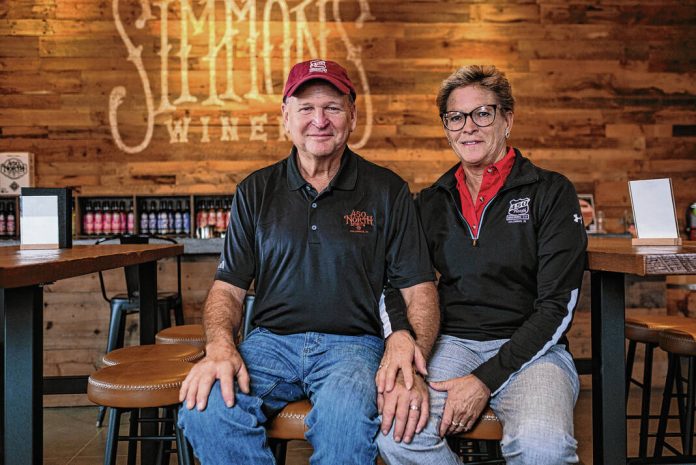
Mike Wolanin | The Republic David and Brenda Simmons pose for a photo in their 450 North Brewing Co., and Simmons Winery location in Columbus, Ind., April 3, 2024. The Simmons family was recently presented with a Hoosier Homestead Award.
From George Washington’s military cook to ownership of one of Bartholomew County’s most popular restaurants, members of the Simmons/Norton families have been involved with food for a very long time.
But it was specifically agriculture that resulted in fifth, sixth and seventh generation members of a Flat Rock Township family to receive special recognition from the state of Indiana.
David and Brenda Simmons, owners of Simmons Winery and 450 North Brewing Company, are the sole Bartholomew County recipients of this spring’s Hoosier Homestead Award. Their children and grandchildren shared in the honor.
Presented twice a year by the Indiana Department of Agriculture, the award recognizes farms that have remained in the same family for more than a century. The couple’s 600-acres farm, located in the vicinity of County Road 425E and 450N, has been the family homestead since 1850.
The couple received the Centennial (100 years) and the Sesquicentennial (150 years) awards from Sen. Greg Walker, R-Columbus, and State Rep. Jennifer Meltzer, (R-Shelbyville).
“It is because of family farms like theirs that Indiana is a leader in the agriculture industry, and I commend them on their work and commitment to their craft,” Walker said.
Standard bearers
If you look closely at the east mural inside the Simmons restaurant, you’ll see small print that states: “Est. 1827.”
That was not the year the restaurant started. Rather, 1827 was the year that homestead founder, farmer and minister Jacob Norton was born in Trumbull, Ohio.
Six years after Jacob’s birth, a family member, William Norton II, moved to Bartholomew County with his wife, Beulah Thayer Norton (d. 1883). It was his father, William Norton I, who served as Washington’s cook during the Revolutionary War.
William and Beulah settled in the unbroken forests of Flat Rock Township in 1833, cleared and developed a farm, and had 16 children. At least five did not survive into adulthood.
Their 13th oldest child, William F. Norton (d. 1900), was considered exceptionally bright. But educational opportunities were quite limited to children of pioneering families in Indiana’s wilderness. In fact, the boy only went to school for two months every winter.
But much of his education was self-taught and his supportive parents worked with him. After fighting in the American Civil War, William F. saved enough money to enroll at Indiana Asbury University (now DePauw). While studying law under the tutelage of Columbus attorney Col. Simeon Stansifer, William was selected over a number of applicants as the principal of Columbus High School. He eventually became one of the town’s most prominent and successful attorneys.
But just as important was that William F. became a standard bearer of excellence for generations of his descendants.
Verified land deeds show the Rev. Jacob Norton obtained 264 acres of the current homestead in 1850. That is the same year that he married Jennings County native Jane Perry Norton (d. 1912), and 10 years after members of the Simmons family first began to settle land north of Hope.
Like many farm couples, Jacob and Jane suffered heartbreaking losses. Although the carvings have faded, there are three headstones on a corner of the property marking the graves of three of their children lost within three or four years in the 1860s, David Simmons said.
On the Simmons side of the family, Thomas Simmons was killed in the Battle of Peachtree Creek in Fulton County, Georgia on July 20, 1864. He is buried in the Simmons Cemetery northwest of Hope.
Nortonburg
In 1885, one of the Norton’s original homes that is located northwest of what is now Simmons Winery burned down. The home was rebuilt in 1886 as the Norton family and others spearheaded the creation of a new community called Nortonburg.
Located along the route of the Columbus, Hope and Greensburg Railroad line, Nortonburg grew quickly into a dozen homes, a grain elevator, general store, sawmill and blacksmith shop.
But when the railroad was abandoned, all but a few houses eventually disappeared. Today, a fading sign along County Road 450s, just east of Simmons Winery, shows where the town was located.
While the town failed, the Nortons did not. Just as William F. Norton excelled, so did two of Jacob and Jane’s sons. Despite their pioneering backgrounds, they would eventually become Dr. Fletcher D. Norton and Dr. Will J. Norton.
A third son and David Simmons’ direct ancestor, Simeon “Sim” Norton (d. 1954), was described in a 1951 profile published in The Evening Republican, predecessor of The Republic, as “one of the county’s most active and best known characters.”
Sim became the husband of the former Ida Miller in 1886. While he remained a lifelong farmer, Sim also served as a teacher for 18 years, as Bartholomew County Recorder from 1901 to 1905, and postmaster of both Nortonburg and Hope.
While Ida died in 1923, Sim Norton enjoyed a long and healthy life. With the exception of what he called a bit of rheumatism in his legs, Sim died at the age of 93.
When families merge
In 1888, Sim and Ida became the parents of a daughter name Nora (d. 1972), who was responsible for linking the Norton and Simmons family by marrying Charles Simmons (d. 1980) on May 9, 1916.
“And that’s how the Simmons came in and started taking everything over,” David Simmons said with tongue firmly planted in-cheek.
Charles and Nora were the parents of William “Bill” Simmons. He and his wife, Marjorie Worrell Simmons, were the parents of the current family patriarch. Bill and Marjorie wed in 1942, and died within days of each other in April 2001.
A 1979 graduate of Hauser High School, David Simmons married Shelbyville native Brenda Kelsay on June 11, 1988. While David farmed about 600 acres of corn, soybeans and produce, Brenda worked as a teacher and coach in Shelbyville and Columbus.
But in 1998, the couple veered off on a unique path that, as David once phrased it, “took the term ‘farming diversity’ to an entirely different level.”
After starting with 4 acres of grapes in 1998, the couple expanded to more than 8 acres when Simmons Winery became one of three new Indiana wineries to open in 2000.
Sales exceed 45,000 bottles in 2012. That same year, a restaurant, craft brewery, retail store and tasting room opened.
Named Entrepreneurs of the Year by the Columbus Area Chamber of Commerce in 2016, the Simmons announce plans for a much larger building or a new restaurant, tasting and brewing facility in 2018.
The 2020 pandemic prompts the Simmons to aggressively market their products online. Suddenly, sales exploded across the nation. And last year, a new division called 450 North Spirits made its debut.
Today, Simmons wine, beer and spirits can be found in approximately 35 states and seven countries, Brenda said.
Family pride
There were few pioneering families with a second generation that included a successful attorney, two physicians and an educator. David Simmons says he’s quite proud of what his ancestors were able to accomplish.
But what seems to make him even prouder is his children. David and Brenda spoke with admiration about the hard work, long hours and creativity of their three children: Daron, Aaron and Lauren. All are full-time salaried employees of Simmons Winery and 450 North Brewing Company.
“They are always coming up with what needs to be done next,” David said. “I’ve always said that -knock on wood – if anything would happen to us, they would be just fine.”
While the grandchildren representing the seventh and latest generation are still quite young, Brenda says they are still responsible for helping her with planting and growing produce.
The successes of the Nortons and Simmons are linked directly to their agricultural heritage, Brenda said.
“When you grow up on a farm, you learn to work hard,” she said. “It translates to business. All of that goes together.”
Heritage is also the reason why, despite all of his enterprises, David still insists on spending 25% to 35% of his time farming with Daron.
“I guess I like to farm so much because I’ve been doing it all my life,” David said. “Every generation before me was a farmer here.”
“I’ve tried for a few years to get him to back off just a bit,” Brenda said. “But farming does get in your blood.”
Research for this story was taken from publications of the Bartholomew County Historical Society, archived copies of the Evening Republican newspaper, and from members of the Simmons family.




